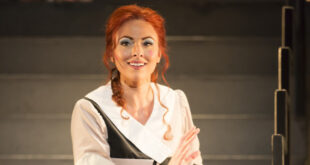“From rags to riches” has been an extremely common literary theme since literacy began. One of its most popular variations is the “Cinderella” story, which itself has spawned oodles of variations. I myself created one such variation, a one-act musical play for my mostly African-American high school students with a pro football twist back in the ’70s. By far the best-known Cinderella tale is that of the Brothers Grimm, with the mean stepmother, two nasty stepsisters and a Fairy Godmother. In Rossini’s opera of 1817 (libretto by Jacopo Feretti) the stepmother is replaced by Don Magnifico, a stepfather, and …
Read More »“Le nozze di Figaro”
The Mozart-da Ponte “Le nozze di Figaro” (1786) is the oldest opera in the standard repertoire. In other words, it is the first “modern” opera. Before “Figaro,” opera was one thing, afterward it was another. Why is this? As Mozart was coming of age, the European political pot was coming to a rapid boil. The American Revolution was just on the horizon, and the social unrest that would explode into the French Revolution was simmering everywhere. Mozart was not what you would call a political radical or a revolutionary, but he was definitely a man of his times. The biggest …
Read More »‘Don Giovanni’ Preview
When people say they are “going to the opera,” the chances are pretty good that they will be taking in one or another piece from the standard repertoire. That’s what I call the sixty-or-so operas that are most often staged by any decent company. In my lifetime, this standard repertoire has expanded and shrunk — some few works have entered in for a short while others are dropped. But the list of the most popular works — all masterpieces that have stood the test of time — remains pretty much the same. The oldest opera in this repertoire is — …
Read More »‘Otello’ Preview
Johan Botta as Otello (Photo by Ken Howard courtesy of the Metropolitan Opera) Shakespeare’s “Othello” is one of the greatest plays of all time. In the characterizations of Desdemona and Iago, the concepts of Pure Good and Pure Evil are contrasted, as is not to be found anywhere else. As for Othello, the play shows how the most powerful of men can be utterly destroyed by jealousy. The theme of a black man and white woman loving each other is to this day controversial, and is a fascinating subject that has remained appealing to audiences ever since the tragedy was …
Read More »‘La Traviata’ Preview
After the passing of Beethoven in 1827, Giuseppe Verdi was the greatest musical genius of the 19th century — a century filled with great composers. This is not merely an opinion. In fact, Verdi’s services were more in demand by far than those of any other composer, and he was paid more for his music than anyone else. Yet Verdi was not the same type of genius as Mozart or Donizetti, who could separate their art from their personal problems. These composers showed again and again that they could create music of a beautiful, optimistic or even humorous nature despite …
Read More »‘Barber of Seville’ Preview
Set sketch by Scott Pask When you hear someone say, “We’re going to the opera,” that person is almost surely going to attend a performance of a Romantic Era, or 19th-century opera. And quite probably, the opera to be viewed will be a “tragic” drama, or at least tell a very dark story. For of the 60 or so works that make up the “standard repertoire” (that tiny fraction of all operas composed that are routinely staged most frequently), only about nine are what you might call “comic” pieces. The most popular of these by far is Rossini’s “Il barbiere …
Read More »‘Madame Butterfly’ Preview
In the 2013-14 season, Lyric Opera of Chicago is presenting three operas that are all in the very first circle of popularity, and have been for many years — Puccini’s “Madama Butterfly,” Verdi’s “La traviata” and Rossini’s “Il barber di Siviglia.” Many who have never seen an opera or know anything about the genre have at least heard of these works. So it may seem unbelievable that all three of these masterpieces, on their opening nights, were pathetic flops! In retrospect, however, there are understandable reasons for this in each case. For the first time, Puccini was so confident in …
Read More » Fra Noi Embrace Your Inner Italian
Fra Noi Embrace Your Inner Italian


